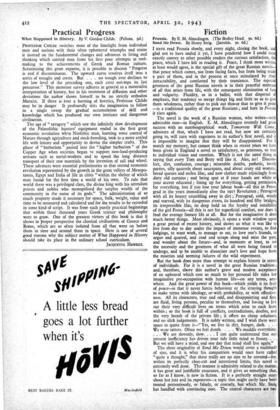Practical Progress
What Happened in History. By V. Gordon Childe. (Pelican. 9d.)
PROFESSOR CHILDE switches most of the limelight from individual men and nations with their often ephemeral triumphs and trains it instead on the fundamental changes and advances in living and thinking which carried man from his first poor attempts at tool- making to the achievements of Greek and Roman culture. Scrutinising this great expanse, it is possible to discern " Progress is real if discontinuous. The upward curve resolves itself into a series of troughs and crests. But . . . no trough ever declines to the low level of the preceding one, each crest out-tops its last precursor." This immense survey adheres in general to a materialist interpretation of history, but in his treatment of diffusion and other deviations the author shows himself to be no strictly orthodox Marxist. If there is ever a burning of heretics, Professor Childe may be in danger It profoundly stirs the imagination to follow in a single sweep the gradual accumulation of skill and knowledge which has produced our own intricate and dangerous civilisation.
The age of " savagery which saw the infinitely slow development of the Palaeolithic hunters' equipment ended in the first great economic revolution wh'n Neolithic man, learning some control of Nature through agriculture and stock-breeding, took to a more settled life with leisure and opportunity to devise the simpler crafts. This phase of " barbarism " passed into the " higher barbarism " . of the Copper Age when societies began to support non-food-producing artisans such as metal-workers and to speed the long distance transport of their raw materials by the invention of sail and wheel. These advances were essential preliminaries to that second economic revolution represented by the growth in the great valleys of Mesopo- tamia, Egypt and India of life in cities " within the shelter of which man found for the first time a world of his own. To rule that world there was a privileged class, the divine king with his attendant priests and nobles who monopolised the surplus wealth of the community in the name of its gods." The administration of so much property made it necessary for space, bulk, weight, value and time to be measured and calculated and for the results to be recorded in some kind of script. It was from such purely practical beginnings that within three thousand years Greek science and philosophy were to grow. One of the greatest virtues of this book is that it shows in proper perspective the classical civilisations of Greece and Rome, which are so often isolated from all that went on before them in time and around them in space. Here is one of several good reasons why the subject matter of What Happened in History should take its place in the ordinary school curriculum.
JACQUETTA HAMMES.






















 Previous page
Previous page